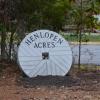Blue Hen Organics is proud of its rich dirt
It takes a couple of good old Sussex County boys to reach under a weathered tarp, pull out handfuls of coffee-ground-colored dirt and smile proudly. And it takes a wise and experienced woman to stand back and quietly acknowledge the good of what’s being done – and add a little excitement of her own: That’s what people want – a dark, rich product. It has a natural, sweeter smell.
Dirt, folks. We’re talking about dirt.
At Blue Hen Organics, tucked behind tree-planted berms on Fox Run Road west of Dagsboro, Barbara Showalter, Shannon Argo, Robert Tunnell and several other employees are taking leaves, branches, wood chips, other yard wastes and poultry litter and converting them into clean and nutrient-rich compost.
Showalter is director of operations, Argo is president, and Tunnell is vice president and one of the investors in the new company.
|
BLUE HEN ORGANICS’ PRODUCTS
|
|
• Blue Hen Organics Compost – A soil amendment for building new landscape beds to improve organic matter in the soil
• Bay Organics Green Compost – A nutrient-rich product that encourages vigorous, healthy lawn growth without threatening the waterways; it is superior as a top-dressing, a base for sod or seeding • Blue Hen Premium Topsoil – A high quality, all-purpose manufactured soil excellent for planting shrubs, annuals or perennials; this topsoil starts with quality soil and is then blended with just the right amount of compost to produce fine, rich topsoil |
Their goal is to take nuisance yard waste and make a product that will be better for people’s yards and gardens than store-bought chemicals. In the process, they want to contribute to cleaner waterways by having fewer chemicals and nutrients running off into streams, creeks, rivers and bays.
“I’m very proud of what’s being created, what’s being done here,” said Showalter. “This material is being composted properly, screened properly and we’re putting out a premium product.” That’s why she moved to Sussex County from Pennsylvania after 15 years in the soil business. “She knows good compost and she has lots of contacts throughout the Mid-Atlantic area,” said Tunnell. “She knows the industry.”
“Our best-case scenario,” said Argo, who is also president of Blue Hen Disposal, “is that we can follow in the footsteps of other people. This is a new product for this area. We need to educate the people of Delaware about its beneficial uses. We think if we do that well, the demand will mirror other areas. We’re starting by educating the distributors. RSC Landscaping and East Coast Garden Center are starting to carry our compost, as is Sussex Tree Co., which just opened up on Route 24, north of Love Creek. We’re slowly adding more distributors.”
“The issue ultimately,” said Tunnell, “will be meeting the demand.”
He said people on Maryland’s Eastern Shore, in the Easton area, and over around Davidsonville on the western shore, have been using high-quality compost for years and understand its benefits. But the farther Blue Hen has to haul its compost, the more transportation cuts into the bottom line. Tunnell said the Pot-Nets communities and Baywood Greens, owned and operated by his family, will also be using some of the compost. They’re hoping to build strong demand throughout Sussex and other parts of the Mid-Atlantic area for the rest.
No small compost pile
Blue Hen Organics is no small compost heap with shovels and pitchforks. Instead, long windrows of composting material – 16 feet wide and 7 feet tall - stretch out over several acres of asphalt. The process to create those windrows involves big machines. One, manufactured in Idaho, takes trash bags full of yard wastes in one end, shreds the bags and separates the organic from the inorganic material.
Another machine, perfected by Mennonite farmers in Oregon, rolls above the windrows and turns the compost to keep it mixed and cooking properly. With proper mixes of yard wastes for organic material, wood and branches to allow oxygen to get in, and nitrogen-rich poultry litter and moisture to complete the recipe, the windrows get shaped like long, giant loaves of bread. When microbes start working on the decaying process, the internal temperature of the windrows can rise to between 131 and 155 degrees.
The temperatures in the cooking windrows are monitored constantly, and they are turned as needed to keep the temperature constant. “We need to keep them at 131 degrees or above for 15 days to kill off weed seeds and any pathogens that may be in them,” said Tunnell. When the microbes run out of matter to work on, the temperature begins to decrease, and the compost matures. “What we’re after is a 30:1 ratio between carbon and nitrogen, so the compost builds the soil and fertilizes it.”
After the compost cools, it is allowed to cure for three months before it’s sifted through a three-eighths-inch screen to create the uniform, finished product. The product is then stored in covered bins before delivery to distributors and homeowners as bulk material.
Working on collection system
Beginning in January, Delaware Solid Waste Authority’s landfill and collection centers will no longer be accepting yard wastes mixed in with trash. Blue Hen Organics thinks the change in policy will benefit their business. “We charge $20 a ton, or a $5 minimum, to accept yard wastes at our facility,” said Argo. “They’re charging $80 a ton or a $7.50 minimum, so we think that will get people coming to us.
“We’re also talking to haulers about bringing yard wastes to us, and beginning in the fall Ocean View will be bringing residential yard waste here. We’re also talking to garden centers about placing large containers at their sites. The idea is they could charge people to collect yard wastes, and then we could haul it away at a fee that would still allow them to make some money. We’ve looked at the county and identified 16 places that would put us in close proximity to about 85 percent of the population. So we’re working through that whole process.”
If the company grows as expected, there’s plenty of room to expand.
“We have nine more acres that we can put asphalt on – to control the leachate – to spread more compost windrows on,” said Tunnell. “And we’re recycling the water from our lined stormwater ditches back on the compost. All of our permits are in order from DNREC [Department of Natural Resources and Environmental Control]. We started in April and we’re rolling.”
The end result? Enough rich dark soil to keep dirt-lovers smiling for a long time.
Blue Hen Organics is located on Fox Run Road west of Dagsboro. From Route 24 west, take Route 13 south to Dagsboro and go right on Nine Foot Road at the Royal Farms stoplight. Go left on Fox Run Road and turn left into the facility about a mile from the Nine Foot Road intersection.
Visit bluehenorganics.com or call 302-732-3211

















































